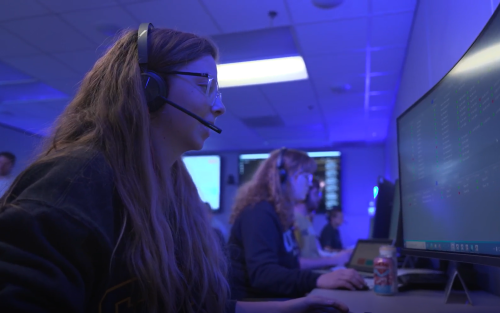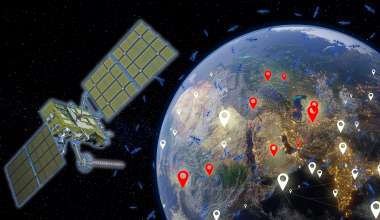Aerospace convened experts from its Concurrent Design Center (CDC) alongside several other departments from across the country to conduct a wargame that examined future space architectures and impact on joint force terrestrial operations. The wargame, part of the Spoon Bender series held in July 2025 at the Aerospace Technology Campus (ATC) in El Segundo, provided a unique opportunity for players to participate in orbital and electronic warfare simulations, preparing them for future roles supporting national defense amid a rapidly evolving space domain operating environment.
Wargames like Spoon Bender provide an environment for developing and building operational-level insights that shape future U.S. space capabilities.
Enhancing Strategic Preparedness
The primary objective of Spoon Bender is to examine the critical impact that space services have on the outcomes of terrestrial conflicts, emphasizing the interconnected nature of space and ground operations. As the nation’s trusted agent for space, Aerospace plays a critical role in bridging operations and engineering to ensure space superiority as threats evolve.
"These games provide more than just a simulated warfighting environment; they are crucial for preparing the next generation of space leaders, acquisition professionals, and engineers," said CDC director Rob Stevens. "Wargaming allows us to explore various scenarios and outcomes, helping us refine our strategic responses to potential threats and develop acquisition strategies to be prepared. Beyond just wargaming, in Spoon Bender, players with little to no experience in contested operations get to see how the complexities and nuances of space warfare play out in decision-making with incomplete information and high stakes.”
Unlike traditional training devices that focus on tactical instruction, Spoon Bender is designed to provide players with a deeper understanding of space warfighting strategies and principles. Today, Spoon Bender is an unclassified virtual gaming environment conducted as an educational tool for engineers, acquisition professionals, and warfighters. When hosted in a classified environment, the capability will enable more realistic scenarios and architectures to further enhance strategic preparedness and inform customer investments.
“Wargaming simulations like Spoon Bender help technical experts as well as space warfighters better understand the interconnectivity between space systems—providing critical services like communication, navigation, and intelligence, surveillance and reconnaissance—and our land or sea-based teammates,” said Daniel Fain, senior project engineer in the Warfighting Analysis Office, Space Architecture and Integration Division. “Command and control through a simulated wargaming event really stresses the limits and enables us to learn what improvements can be made for better tools and exercises going forward.”
Behind the Scenes
Spoon Bender is a multi-player real-time strategy-style game with players acting across multiple mission capabilities.
“The name Spoon Bender stems from my appreciation of the Matrix movie franchise and this also influenced the names of different player call signs.” said Stevens
The wargame was completed in three phases: a training phase, operational planning phase, and game day. The July exercise featured representative scenarios involving satellite communications, electronic jamming, and orbital maneuvers. Prior to the wargame, players completed an intensive training curriculum. This equipped participants with essential fundamentals while enabling them to test their decision-making skills in a high-pressure environment.
During the operational planning phase, players were divided into two teams: Blue and Red, each tasked with objectives that supported their respective joint forces. Opposing teams selected their space and intelligence ‘kit’ to gain a possible edge over their opponent. They also strategized and scheduled their opening moves.
On game day, players executed their scheduled moves and responded to adversary attacks against their forces. The simulation translated player actions into game movements while mimicking uncertainties due the fog of war. A White cell adjudicated the outcomes to terrestrial joint forces based on the availability of the Blue and Red space-based services.

Effective communication and coordination proved pivotal throughout the game event. Players honed their skills managing critical information exchanges, which can be the difference between mission success and failure. By engaging in simultaneous electronic and orbital warfare campaigns on game day, players gained insight into the complexities of executing multi-domain command and control. The players also had to manage the flow of information and make high-stakes decisions under time constraints.
"The pressure of making real-time decisions was immense, but it also highlighted the importance of quick, strategic thinking," said Morgan Wright, who served as the Space Warfare Commander for the Blue team and was responsible for overseeing operational decisions and ensuring effective coordination among team members. "It was a valuable lesson in strategic thinking and rapid decision-making."
Preparing Future U.S. Space Capabilities
Spoon Bender provides an environment to explore the outcomes of space warfighting choices and to gain insights that enable more informed architecture recommendations.
Since the game outcome is heavily influenced by early decisions such as game kit selection and employment strategies, it parallels the challenge of matching acquisition choices to operational strategies in an evolving threat environment.
“The space domain is rapidly changing and evolving,” said Fain. “Using Spoon Bender to improve our capabilities, training, and integration keeps us outpacing our opponents, in the game environment and the real world.”
Since warfare in space is unprecedented, there are no established lessons learned from experienced space warfighters. When planning future space capabilities, general principles of warfare from centuries of terrestrial warfighting apply but must recognize space warfighting comes with intricacies that are unique to the space domain. Wargames can help prepare the nation for a contested space environment.
“Simulating space conflicts in wargames like Spoon Bender will help refine strategies and develop resilient agile systems necessary to win the war in space,” Stevens said.





